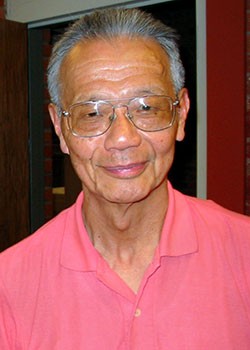Chinese linguist Tsu-Lin Mei dies at 90
By Kathy Hovis
Tsu-Lin Mei, professor emeritus in the Department of Asian Studies in the College of Arts and Sciences, died Oct. 14 in Ithaca. He was 90.
Mei was one of the most important Chinese historical linguists of the 20th century, said John Whitman, professor of linguistics (A&S).
“He bridged the gap between the innovative non-Chinese scholars and more traditional Chinese philology,” Whitman said. “Tsu-Lin had wonderfully productive relationships with North American sinologists such as Jerry Norman at Washington and Victor Mair at [the University of Pennsylvania]. When he and Nicholas Bodman were both active at Cornell in the 1980s, Cornell was perhaps the leading place for Chinese historical linguistics in the world.”
Mei’s research focused on Chinese historical grammar, Chinese historical dialectology, Old Chinese morphology and Sino-Tibetan comparative linguistics. He authored many papers in Chinese academic journals and was elected to the Academia Sinica in Taiwan in 1994.
After retiring from Cornell, he served as a visiting professor at Stanford University, Beijing University, the Chinese Academy of Social Science in Beijing, Taiwan University, the Hong Kong University of Science and Technology, Tsinghua University in Beijing and the National Tsing Hua University in Hsinchu, Taiwan, among others.
“For me, one of the most fascinating contributions Professor Tsu-Lin Mei made was the 1976 article with Jerry Norman where the two scholars laid out the fragmented linguistic evidence, preserved here and there in Chinese documents, for the presence of the non-Chinese people that once lived in what is now South China, before they were conquered and eradicated or assimilated by the Chinese state, eradicating their languages and identities,” said Magnus Fiskesjö, associate professor of anthropology (A&S).
Mei was born in 1933 in Beijing and came to the U.S. with his parents in 1949, the year of the founding of the People’s Republic of China. He received his bachelor’s degree in mathematics from Oberlin College in 1954, his master’s in mathematics from Harvard University in 1955 and his Ph.D. in philosophy from Yale University in 1962. He taught at Beijing Language and Culture University, Yale and Harvard before coming to Cornell in 1971 as associate professor of Chinese literature and philosophy.
During his 30 years at Cornell, he chaired the Department of Asian Studies, directed the China-Japan Program (the East Asia Program) and was the Hu Shih Professor from 1994 to his retirement in 2001.
Colleagues also remembered his warm nature, his frequent dinner parties, his love of tennis and his support for Cornell.
“When I first arrived at Cornell, I was more than a little bit intimidated by him,” said Allen Carlson, professor of government and director of the Levinson China and Asia Pacific Studies Program. “Professor Mei was so widely read, and so present in intellectual conversations, I worried that I must have looked the fool in contrast. But he was always very kind to me, and asked questions about my work and interests. It was an honor to get to know him, even if just a bit, over the years.”
Brett de Bary, professor emeritus in Asian studies and comparative literature (A&S), said Mei’s fundraising efforts supported Cornell graduate students, as well as campus building projects.
“He worked mightily to raise funds for Cornell at large, as well as for the support of scholarship and teaching related to East Asia,” she said. “We have Tsu-Lin to thank for the existence of our Lee Teng-hui and Hu Shih fellowships. Because of his prestige as a member of Academia Sinica, he brought in very generous contributions from Taiwan for the construction of Duffield Hall (in Cornell Engineering), demonstrating his dedicated support to Cornell’s mission at large.”
Mei continued to be vigorously engaged in research years after his 2001 retirement, colleagues said, and faithfully attended the Cornell Classical Chinese Colloquium, offering insights to younger professors and students.
Mei is survived by his wife of more than 50 years, Teresa; daughters Carol and Jacqueline and son, Eugene, from his first marriage to Yu-shih Chen; and four grandchildren – Nicholas, Emily, Riley and Liya. A memorial service is scheduled for Nov. 25 at 3 p.m. in the Auditorium at Kendal at Ithaca, with a reception following. Gifts in his memory may be made to the Department of Asian Studies at Cornell.
Kathy Hovis is a writer for the College of Arts and Sciences.
Media Contact
Abby Kozlowski
Get Cornell news delivered right to your inbox.
Subscribe

